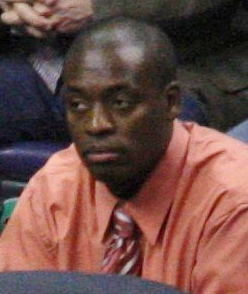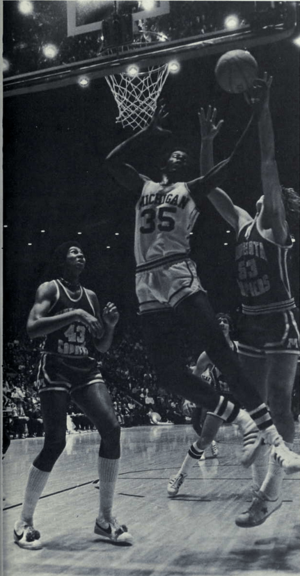Phil Hubbard facts for kids

Hubbard in 2008
|
||||||||||||||
| Personal information | ||||||||||||||
|---|---|---|---|---|---|---|---|---|---|---|---|---|---|---|
| Born | December 13, 1956 Canton, Ohio, U.S. |
|||||||||||||
| High school | Canton McKinley (Canton, Ohio) | |||||||||||||
| Listed height | 6 ft 8 in (2.03 m) | |||||||||||||
| Listed weight | 215 lb (98 kg) | |||||||||||||
| Career information | ||||||||||||||
| College | Michigan (1975–1979) | |||||||||||||
| NBA Draft | 1979 / Round: 1 / Pick: 15th overall | |||||||||||||
| Selected by the Detroit Pistons | ||||||||||||||
| Pro career | 1979–1989 | |||||||||||||
| Coaching career | 1997–2018 | |||||||||||||
| Career history | ||||||||||||||
| As player: | ||||||||||||||
| 1979–1982 | Detroit Pistons | |||||||||||||
| 1982–1989 | Cleveland Cavaliers | |||||||||||||
| As coach: | ||||||||||||||
| 1997–2000 | Atlanta Hawks (assistant) | |||||||||||||
| 2000–2003 | Golden State Warriors (assistant) | |||||||||||||
| 2003–2009 | Washington Wizards (assistant) | |||||||||||||
| 2011 | Dominican Republic | |||||||||||||
| 2011–2013 | Los Angeles D-Fenders (assistant) | |||||||||||||
| 2013–2014 | Santa Cruz Warriors (assistant) | |||||||||||||
| 2014–2015 | Los Angeles D-Fenders | |||||||||||||
| 2015–2018 | Jeonju KCC Egis (assistant) | |||||||||||||
| Career highlights and awards | ||||||||||||||
|
||||||||||||||
| Career NBA statistics | ||||||||||||||
| Points | 7,228 (10.9 ppg) | |||||||||||||
| Rebounds | 3,538 (5.3 rpg) | |||||||||||||
| Assists | 857 (1.3 apg) | |||||||||||||
|
Medals
|
||||||||||||||
Philip Gregory Hubbard (born December 13, 1956) is an American former professional basketball player and coach. He is best known for winning an Olympic gold medal and for his 10-year career in the National Basketball Association (NBA).
Hubbard played for the Detroit Pistons and the Cleveland Cavaliers from 1979 to 1989. After his playing career, he worked as a coach for several teams, including the Washington Wizards.
Contents
Early Basketball Career
High School Star
Hubbard first gained attention playing basketball at Canton McKinley High School in Canton, Ohio. In 1975, his talent was recognized when he was named Ohio's high school player of the year.
College Years at Michigan
After high school, Hubbard played for the Michigan Wolverines at the University of Michigan. His coach was Johnny Orr.
As a freshman, he was a key player on the team that made it all the way to the 1976 NCAA Championship Game. Although they lost to Indiana University, Hubbard had an amazing season, averaging 15.1 points and 11.0 rebounds per game.
The next year, in 1977, Hubbard was named an All-American, an honor given to the best college players in the country. He led the Wolverines to a Big Ten championship, averaging an incredible 19.5 points and 13.0 rebounds per game. His 389 rebounds that season is still a record at Michigan.
Unfortunately, Hubbard suffered a serious knee injury that required surgery. This injury forced him to miss his entire junior year and would affect him for the rest of his career. Despite this, he had a fantastic college career, averaging a double-double (double-digit numbers in two categories) with 16.5 points and 11.1 rebounds per game.
Winning Olympic Gold
In 1976, Hubbard was chosen to be on the U.S. men's Olympic basketball team. He played in the 1976 Summer Olympics in Montreal, Canada.
Coached by the legendary Dean Smith, Team USA won the gold medal. Hubbard played an important role, even scoring 10 points in the final gold medal game against Yugoslavia.
NBA Playing Career
Detroit Pistons (1979–1982)
In the 1979 NBA draft, Hubbard was selected by the Detroit Pistons as the 15th overall pick. The NBA draft is how professional teams choose new players from college. Even though he could have played one more year in college because of his injury, he decided to start his professional career.
Hubbard played for the Pistons for three seasons. In 196 games, he averaged 11.6 points and 6.0 rebounds per game.
Cleveland Cavaliers (1982–1989)
On February 16, 1982, Hubbard was traded to the Cleveland Cavaliers. He would spend the rest of his playing career with the team.
He played for the Cavaliers for eight seasons. In 469 games, he averaged 10.6 points and 5.0 rebounds. Over his entire 10-year NBA career, Hubbard played in 665 games and scored a total of 7,228 points.
Life After Playing
After he stopped playing in the NBA, Hubbard stayed involved with basketball. He first worked as a scout, looking for new talent for NBA teams.
Coaching Journey
Hubbard later became an assistant coach. He worked for several NBA teams:
- Atlanta Hawks (1997–2000)
- Golden State Warriors (2000–2003)
- Washington Wizards (2003–2009)
He also coached in the NBA G League, a developmental league for the NBA. In 2014, he became the head coach of the Los Angeles D-Fenders. In 2015, he took a coaching job in South Korea with the Jeonju KCC Egis.
Personal Life and Honors
Hubbard earned a degree in education from the University of Michigan in 1979. He has two children, Maurice and Whitney, who were also athletes in high school.
Hubbard has received many honors for his basketball career:
- In 1992, he was inducted into the University of Michigan Hall of Honor.
- In 2004, the University of Michigan retired his #35 jersey, meaning no other player can wear that number.
- In 2008, he was inducted into the Ohio Basketball Hall of Fame.
Career Statistics
The tables below show Phil Hubbard's statistics for each season he played in the NBA. This includes points, rebounds, and assists per game.
| Legend | |||||
|---|---|---|---|---|---|
| GP | Games played | GS | Games started | MPG | Minutes per game |
| FG% | Field goal percentage | 3P% | 3-point field goal percentage | FT% | Free throw percentage |
| RPG | Rebounds per game | APG | Assists per game | SPG | Steals per game |
| BPG | Blocks per game | PPG | Points per game | Bold | Career high |
NBA
Regular season
| Year | Team | GP | GS | MPG | FG% | 3P% | FT% | RPG | APG | SPG | BPG | PPG |
|---|---|---|---|---|---|---|---|---|---|---|---|---|
| 1979–80 | Detroit | 64 | — | 18.6 | .466 | .000 | .750 | 5.0 | 1.1 | .8 | .2 | 9.1 |
| 1980–81 | Detroit | 80 | — | 28.6 | .492 | .333 | .690 | 7.3 | 1.9 | 1.0 | .3 | 14.5 |
| 1981–82 | Detroit | 52 | 38 | 21.2 | .505 | .000 | .650 | 5.2 | 1.3 | .7 | .3 | 10.0 |
| 1981–82 | Cleveland | 31 | 2 | 23.7 | .467 | .000 | .726 | 6.5 | .8 | .9 | .1 | 10.4 |
| 1982–83 | Cleveland | 82 | 38 | 23.8 | .482 | .000 | .689 | 5.7 | 1.1 | 1.1 | .1 | 9.5 |
| 1983–84 | Cleveland | 80 | 6 | 22.5 | .511 | .000 | .739 | 4.8 | 1.1 | .9 | .1 | 10.8 |
| 1984–85 | Cleveland | 76 | 55 | 29.6 | .505 | .000 | .751 | 6.3 | 1.5 | 1.1 | .1 | 15.8 |
| 1985–86 | Cleveland | 23 | 21 | 27.8 | .470 | .000 | .679 | 5.2 | 1.3 | .9 | .1 | 11.4 |
| 1986–87 | Cleveland | 68 | 68 | 30.6 | .531 | .000 | .596 | 5.7 | 2.0 | 1.0 | .1 | 11.8 |
| 1987–88 | Cleveland | 78 | 59 | 20.9 | .489 | .000 | .749 | 3.6 | 1.0 | .6 | .1 | 8.4 |
| 1988–89 | Cleveland | 31 | 0 | 6.2 | .444 | — | .680 | 1.3 | .4 | .2 | .0 | 2.4 |
| Career | 665 | 287 | 23.9 | .495 | .038 | .706 | 5.3 | 1.3 | .9 | .1 | 10.9 | |
Playoffs
| Year | Team | GP | GS | MPG | FG% | 3P% | FT% | RPG | APG | SPG | BPG | PPG |
|---|---|---|---|---|---|---|---|---|---|---|---|---|
| 1985 | Cleveland | 4 | 4 | 25.3 | .553 | 1.000 | .765 | 5.0 | .8 | .8 | .0 | 15.5 |
| 1988 | Cleveland | 3 | 0 | 7.0 | .167 | — | .000 | 1.0 | .0 | .0 | .0 | .7 |
| 1989 | Cleveland | 1 | 0 | 1.0 | — | — | — | .0 | .0 | .0 | .0 | .0 |
| Career | 8 | 4 | 15.4 | .490 | 1.000 | .722 | 2.9 | .4 | .4 | .0 | 8.0 | |
See also
 In Spanish: Phil Hubbard para niños
In Spanish: Phil Hubbard para niños
- University of Michigan Athletic Hall of Honor


